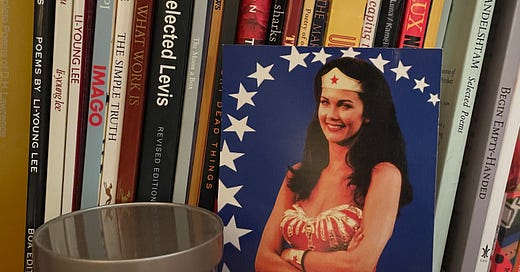Another Time to Leave the Cape in the Closet
The tension between responsibility and possibility
It’s a question I’ve rubbed so often the penny’s face has begun to fade. Which will drive my decision about what’s next: money or my desire to explore other paths that beckon before my time is up?
As a teacher-librarian, I’m grateful that I’ll receive a pension when I retire. A friend recently ran the numbers and determined that staying in public education until he’s 60 or 65 promises higher financial yields than experimenting with a different career (something we’ve mused about on carpools to school).
I expect I’d find the same. But what if a less traveled route stretches my mind in exciting ways or allows me to have a positive impact on more people—through writing, teaching, or something I don’t even know about yet? At what point are these gains worth more than a larger check? Could I have both?
My decision could impact more futures than mine. I might end up with less funds to help my family than I could have had. This is a truth. Yet I wonder if I’m evoking that risk to distract myself from my fear of veering from the familiar—and failing.
I’m an oldest child. Responsibility is my thing. What began at three as an expectation to look out for my little brother seeped in, my Gram among those who modeled its importance (something I wrote about in a guest post a few weeks ago). This colored how I perceive my role in most situations, how I measure success. Can people depend on me?
It sounds like a positive trait, and most of the time, it is. I arrive early, bring the mop or laptop, roll up my sleeves. But in my quest to be capable, I sometimes shift into caped crusader mode, albeit without a cape or bullet-deflecting bracelets, and leap in without asking.
My wife calls me on it. Through her numerous surgery recoveries, she’s taught me to leave my cape in the closet - to respond when she asks for help and stand back when she wants to do something herself even if it’s difficult or takes longer than usual. I don’t always interrupt my internal swoop-in loop when it would be the better choice, but I’m learning.
Responsibility also suggests steadiness, thus that “rock” reference for reliable people. When change or risk is - or may be - necessary, that rock can drag. That’s part of what I’m sensing now.
Mary Oliver concludes her oft-quoted poem “The Summer Day,” with these lines:
Doesn’t everything die at last, and too soon?
Tell me, what is it you plan to do
with your one wild and precious life?
And that’s the trouble, right? If I had another, I’d wait. No question. I’d stay in this rewarding career I enjoy, working with students and colleagues who inspire and challenge me. Then, in life two, I’d try something new.
As I weigh that worn question again and again, feeling its familiar warmth and worry, I must tease apart how my responsibilities and my attachment to being responsible influence my thinking. I must resist ascribing expectations to the people who love me that elevate me to superhero when that’s not something they’re asking of me.
When they love me capeless. Can I do the same?





I rubbed that penny many times too (a phrase I just learned from you and I love it) before finally walking away from a high-paying but high-stress job in 2016. Yes, I had to cobble together some part-time contracts and learn to live on less, but what I’ve gotten back in return has been worth it. Sometimes jumping without a net (or a cape) is worth the risk, just to challenge our aging selves to realize we can start over, we can change paths, and we’ll be just fine.
This resonates with me, been there, and you say it so beautifully. Of course you do, you're a poet.